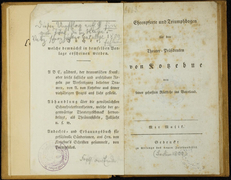Romantic satire, "With Music."
Charlotte Köhler
Thursday, September 6, 2018

The following was written by Charlotte Köhler, our intern from summer 2018:
At the end of the 18th century, the first thinkers of the German Romantic era—in particular the group centered in Jena around the brothers August Wilhelm (1767-1845) and Friedrich Schlegel (1772-1829)—developed the idea of a “universal poetry,” meaning a form of art without the boundaries of genre that constantly evolves through a continuous interplay coming from different directions. The early Romantics liked to mix different literary genres not only with each other, but also with music and the fine arts.
A nice example of this is the small volume Ehrenpforte und Triumphbogen (RISM ID no. 1001045150). This satire, penned by August Wilhelm Schlegel, was published anonymously at the end of 1800 and was rapidly disseminated. The text is a merciless but extremely artistic satire of the character and works of the then very popular dramatist August von Kotzebue (1761-1819). Kotzebue can also be found in RISM because many of his stage works were set to music, some even by renowned composers.
Schlegel’s satire consists of verses of various kinds and a drama in two acts. As a grand finale, the volume contains one page with music. In the spirit of universal poetry, two of the poems (“Festgesang” and “Ode”) are given a melody and accompaniment and thus advance out of the literary realm and into the musical. Listen to the “Festgesang” here (music starts at 1:45):
Even though letters provide evidence that the Schlegel household had a “Clavier,” nothing is known about August Wilhelm Schlegel’s musical activities or any further compositions. The pieces are musically and harmonically rather simple, which underlines the lyrics all the more pointedly. This context makes it seem possible that the author, translator, and scholar—committed to the uncompromising realization of the Romantic idea—here become an occasional composer. Anyone reading this know more? Any leads are welcome!
Image: Title page from the copy of Ehrenpforte und Triumphbogen in the Goethe-Haus, Frankfurt (D-Ff), shelfmark IX K 90 / S 1. Photo courtesy of Charlotte Köhler and published here with the kind permission of the Freies Deutsches Hochstift.
Share Tweet EmailCategory: New at RISM

